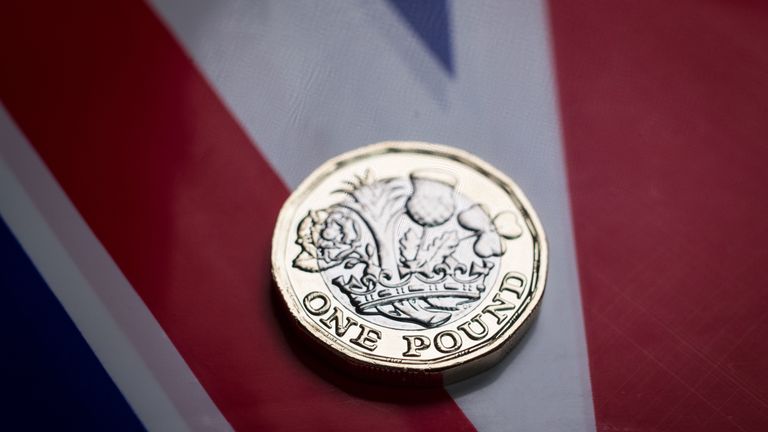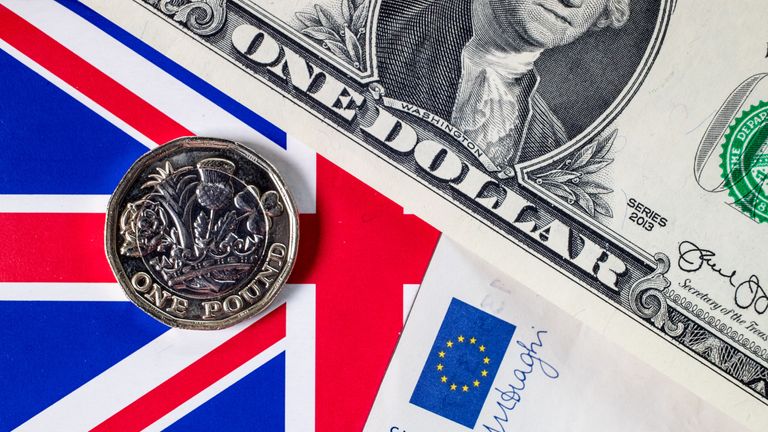Coronavirus: Why the pound is taking a pummelling as crisis deepens
Sky's Ian King explains why he sees a runaway train threat to sterling as the currency bleeds value against the dollar and euro.
Wednesday 18 March 2020 18:43, UK
The convulsions in equity and bond markets have naturally grabbed most of the financial headlines as the COVID-19 outbreak has widened.
Yet there have been some equally eye-catching movements in currency markets.
Today saw the pound fall sharply against the US dollar and the euro.
The decline against the greenback was particularly stark. At one point, the pound hit just $1.1539, a fall of more than 4% - which is a rout in foreign exchange (FX) markets.
It is the lowest level the pound has hit against the dollar since 1985.
It is the continuation of a brutal trend. The pound has now fallen by more than 12% against the US dollar since the beginning of the year while, against the Euro, it has fallen by more than 9%.
There are a number of possible explanations why.
One is that, at times of financial stress, the US dollar attracts safe-haven buying.
This is undoubtedly a factor in the pound's precipitous fall against the greenback on Wednesday.
Nor, in this respect, is the pound alone. Several other currencies have also today hit their lowest level against the US dollar for many years.
The Australian dollar, for example, fell to its lowest level against the US dollar since January 2003.
The New Zealand dollar has not been this low against its American equivalent since March 2009. The Canadian dollar also slumped to a four-year low against the dollar.
And the Norwegian krone, which has been battered by the sharp falls in oil and gas prices, fell to its lowest level of all-time against the dollar.
Even other renowned safe-haven currencies, such as the Japanese yen and the Swiss franc, have been on the back foot today against the dollar.
So strength in the dollar and demand for dollars is one reason for the dramatic fall in the sterling-dollar exchange rate which, in market jargon, is known as 'cable' after the transatlantic cable that was first used to relay exchange rates between London and New York in the mid-19th century.
Yet that explanation only goes so far.
Another explanation is a need for what is known as 'liquidity' - the ease with which assets can be bought and sold.
At times of financial stress, investors and traders seek the most liquid assets, those assets that can easily be turned into cash in an emergency.
The most liquid assets of them all are US Treasury bonds - US government IOUs - and that explains why US dollars are always sought after.
The Euro, as the world's second most heavily-traded currency after the US dollar, has taken on certain safe haven qualities for those seeking liquidity and, accordingly, it too is higher against the pound.
A third factor is the way that foreign exchange investors were positioned going into the coronavirus emergency.
The market was 'long' of the pound - in other words, investors had bought it in anticipation of further gains - following the decisive general election result in December, which had raised hope of clarity over the UK's departure from the EU.
Accordingly, when the sell-off in sterling gathered pace, there will have been plenty of traders and investors, particularly those who prefer to trade on a relatively short-term basis, to unwind some of those positions. The latest data suggests, however, that the market still remains 'long' of the pound.
A fourth explanation being suggested in some quarters is that the UK government's response to the coronavirus crisis, in particular the £330bn fiscal stimulus programme announced on Tuesday by Chancellor Rishi Sunak, will lead to a huge increase in UK government borrowing.
More UK government borrowing means more issuance of UK government IOUs, or gilts, meaning a fresh wave of sterling-denominated assets hitting the market. Under those circumstances, all other things being equal, one would expect the pound to fall.
The UK's persistent current account deficit, the difference in value between the goods and services Britain exports and the goods and services Britain imports, means a constant need for foreign investment - what Mark Carney, the former Bank of England Governor, famously described as "the kindness of strangers".
Elsa Lignos, global head of foreign exchange strategy at RBC Capital Markets in London, said in a note: "The question we've been discussing with clients is where will fiscal stimulus be currency-positive and where might it not.
"While G10 countries [the countries that use the 10 most actively-traded currencies around the world] have varying debt levels, with rates this low most have enough fiscal room to act. The issue may be external deficits - and we've highlighted the UK before as being a case where the large private sector deficit and current account deficit puts the pound more at risk than other currencies."
Added to this, in some quarters, is a suggestion that the chances of the UK achieving a trade deal with the EU, before its post-Brexit transition period at the end of the year expires, are receding as governments everywhere are pre-occupied with the coronavirus outbreak. In other words, the chances of a so-called 'cliff edge' Brexit are increasing, which is perceived by investors as bad for the pound.
Richard Falkenhall, senior foreign-exchange strategist at the Swedish bank SEB, told the Wall Street Journal: "It seems like the position from the British government has not changed at all on the importance of this date."
For others, though, this is mainly a story about the dollar's strength.
Ranko Berich, head of market analysis at the brokerage Monex Europe, said: "Idiosyncratic factors such as the UK's monetary and fiscal response [to coronavirus] or Brexit are beside the point: this is about the US dollar, which is proving unstoppable as global financial markets stare into the abyss of crisis-like conditions."
There are also some in the market who think the pound has been oversold.
Thomas Flury, strategist at UBS investment bank, said this was certainly true with regard to the euro.
He said in a note to clients: "The pound seems to be exposed for now, as many fundamental investors had built up long positions in the pound that are now being cleared. This position-clearing should, in our view, have no fundamental long-term impact given that the European economy is as much exposed to the global pandemic as the UK economy is.
"The UK reacted early, with monetary and fiscal stimulus, in a way that Europe has not yet been able to do. We think the initiative should eventually support the pound."
Could the pound fall further?
It is certainly possible and, particularly, against the US dollar. The greenback at the moment feels like a runaway train.










